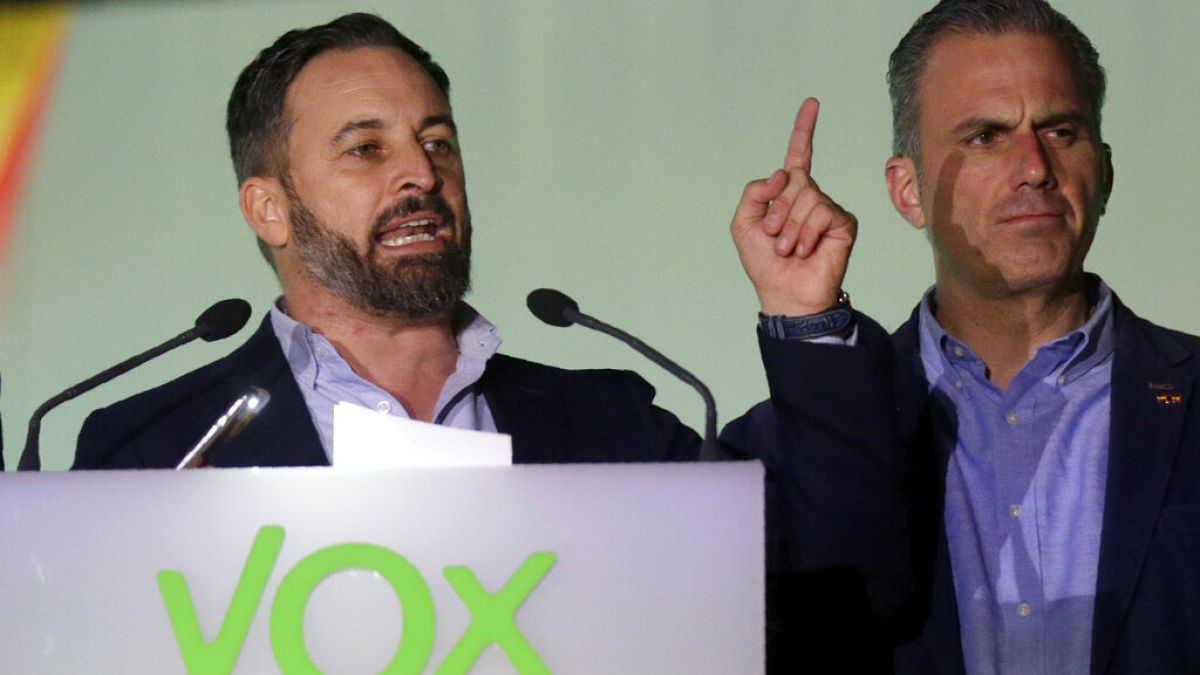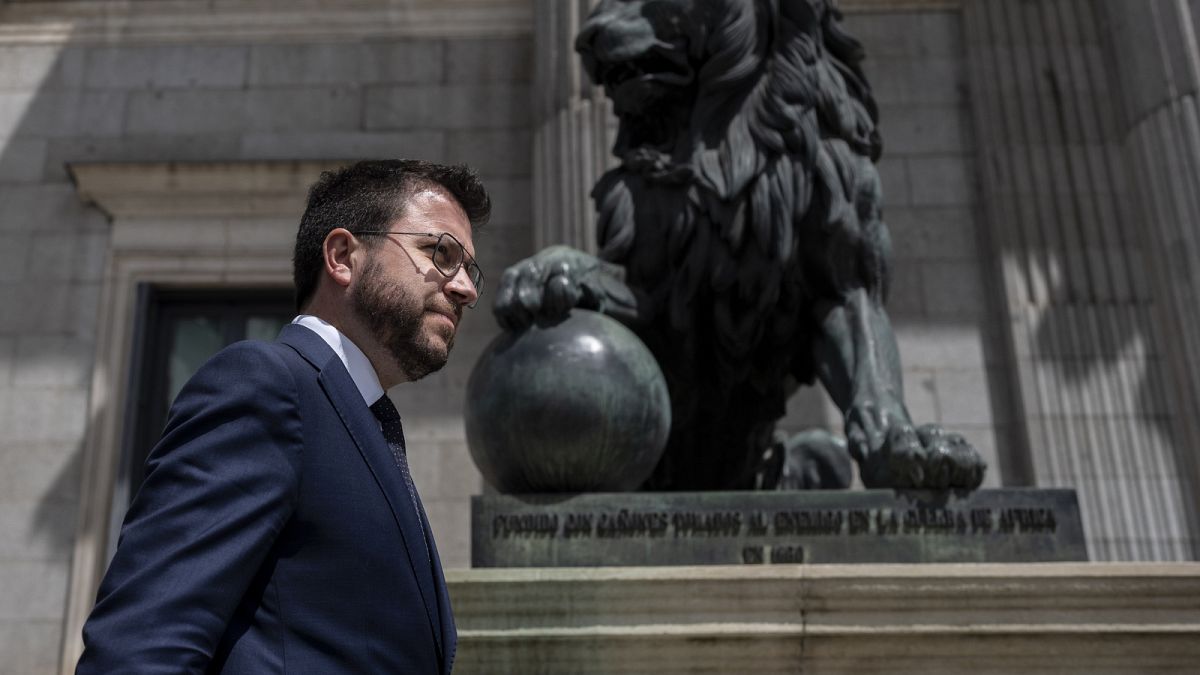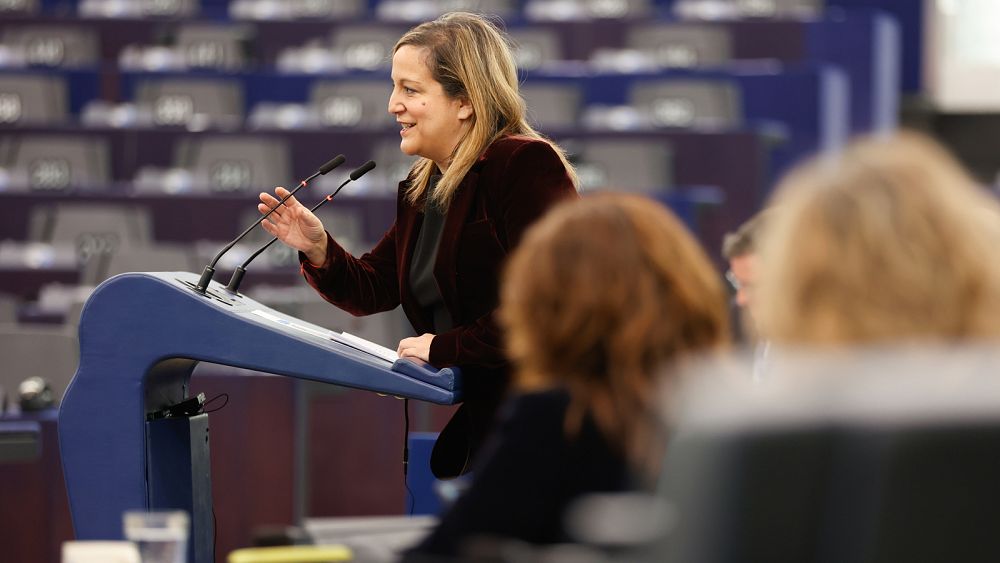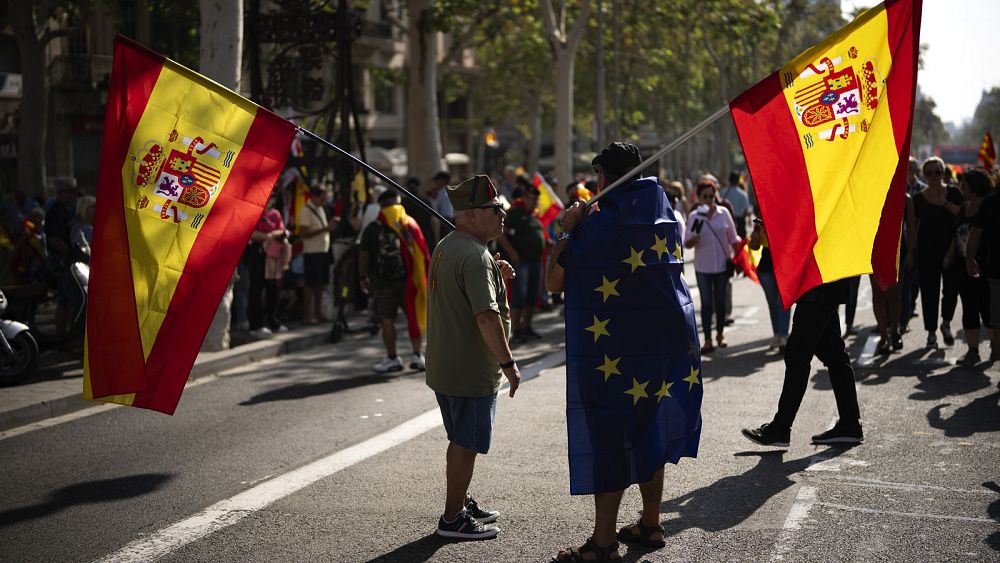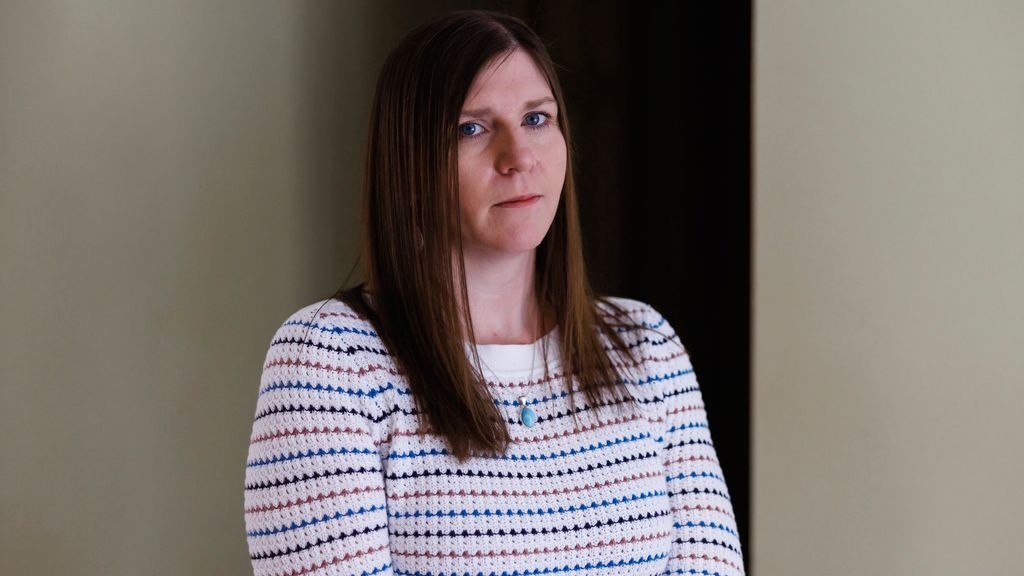World
Can Basque, Catalan and Galician really become EU languages?
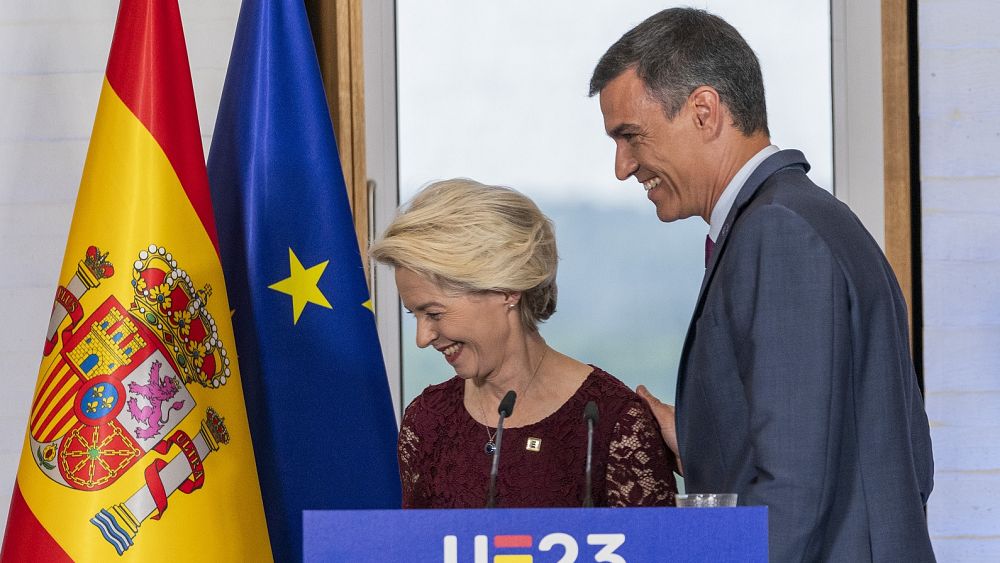
Having an additional official EU language can result in a hefty price tag for the union’s institutions.
Pedro Sánchez, Spain’s acting Prime Minister, is trying to secure the backing of separatist parties to stay in power by having the EU recognise some regional languages but cost, possible lack of qualified personnel and wariness by other countries could scupper his plans.
Madrid wrote to the EU last week asking that Basque, Catalan, and Galician be added to the EU’s list of 24 official languages, placing the ball squarely in the EU’s court. Any decision on the adoption or refusal of the languages will likely be made by the General Affairs Council when it meets in September.
Relying on the support of smaller regional parties is nothing new forSánchez who came to power in 2018 following the first-ever successful vote of no-confidence against the then PM. He followed that up two years later by formingSpain’s first coalition since the country’s return to democracy which only passed due to deals cut with Catalan separatist parties, causing outrage amongst right-wing politicians.
The controversial Catalonian independence referendum and Madrid’s subsequent imposition of direct rule over Catalonia had happened just months before the 2020 coalition vote. Tension and distrust between Madrid and the autonomous region were at levels not seen in decades.
In the five years since then, tensions have decreased and independence is not the critical topic it once was. However, the reliance of Pedro Sánchez and his socialists on regional parties, especially EH Bildu, became a central plank of the opposition conservative People Party’s election campaign.
Why are regional languages on the tip of Sánchez’s tongue?
The July 2023 general election resulted in a hung parliament with neither the left nor right-wing blocs winning enough seats to form a coalition government on their own. If Sánchez wants to be voted in as PM, he will have to convince even more ardently separatist parties to vote for him.
This explains the PM’s sudden interest in the promotion of Spain’s regional languages.
Since it unveiled its language plans last week, Sánchez’s government has moved quickly to widen the acceptance of regional languages. After winning the support of separatist parties, close Sánchez ally and Catalan speaker Francina Armengol was voted in as the new speaker of the lower house.
Armengol has announced that Basque, Catalan and Galician will now be allowed within Spain’s congress. She said using these three languages in congress “is a fact of democratic normalcy” as the “congress must represent the real Spain and one of the great strengths of our country is its linguistic diversity and richness.”
But she asked for patience and “the space to meet with the parliamentary groups, seek agreements and start working so that the use [of the three co-official languages] becomes a reality in the Congress of Deputies”.
Although technically never banned, each speaker has had the discretion over whether they permit the speaking of regional languages in Congress. Historically, a few phrases in regional languages have been permitted, but entire speeches in them were not allowed.
Xavier Collerafter, a professor at UNED, predicts that after “a while, it will become quite normal to speak in Castilian Spanish. Those who want to make a statement, they will speak in Catalonia in Basque at the risk that not many people will understand and that not many people will want to use the translation system”.
Allowing the speaking of regional languages within Spain will be much easier than getting the EU to adopt three new languages though.
EU wary of expensive Pandora’s box proposal
Although multilingualism is enshrined in the organisation’s Charter of Fundamental Rights, the adoption of any new languages has to be unanimously agreed by the 27 countries of the Council of the EU. Member states will have two main concerns, one will be fear of a domino effect and the second, and probably the decisive one, will be cost.
There are many co-official national and regional languages in different EU member states, for example, Frisian, which has 500,000 speakers spread out over parts of the Netherlands. When deciding whether to vote in favour of adopting Basque, Catalan and Galician as official EU languages, the Netherlands will be aware that domestic pressure may grow to have Frisian put forward as an official language if other regional languages are successfully adopted.
Then there’s also the all-important cost aspect of this debate.
A spokesman for the Commission told reporters this week that the institution spent about €300 million on translation last year but that they “don’t have a breakdown by languages.”
Asked how much the addition of these three regional languages could cost, he added that “it all depends on individual circumstances, it all depends on the language you speak and at the moment it’s a hypothetical question so I’m not in a position to share an estimate in that respect.”
From Irish to Turkish
Although the latest language to be adopted by the EU was Croatian in 2013, the most useful case study to look at is probably the adoption of the Irish language.
Despite Irish being granted working language status in 2007, it wasn’t until 15 years later that this took effect. That delay was due to a shortage of translation staff; there are only just under 2 million Irish speakers in Ireland, though a lack of technological resources also hindered the language’s full adoption.
Partly because of this, in 2017, Irish was the EU’s most expensive language, costing up to €42 (£39) a page for translations. The European Parliament overspent its budget by over €3 million in the same year.
While Catalan is spoken by around 10 million people, Basque and Galician may suffer from Irish-style cost overruns and translator shortages. Basque in particular, a language isolate and thought to be Europe’s oldest surviving language, is only spoken by around a million people.
However, the EU has experience in managing to conveniently tongue-tie itself when it comes to questions about adopting new official languages. In early 2016, Cyprus asked the EU to recognise Turkish as an official language, in an attempt to boost its reunification process. Seven years later and there’s been hardly a peep from any EU institution on the question of adopting Turkish.
Yet this situation might suit Sánchez quite well. He has shown regional parties his support by sending the letter but whether they’re adopted as EU languages are now a Madrid problem, that’s a Brussels problem now.

World
Penske suspends Cindric and 3 others in the wake of a cheating scandal ahead of the Indianapolis 500
Roger Penske on Tuesday said he has suspended the president of Team Penske along with three others for two races for their roles in the cheating scandal that has rocked IndyCar ahead of the Indianapolis 500.
Penske said in an interview with The Associated Press that a review done by his general counsel found that the team had no “malicious intent by anyone” and chalked up the incident as a breakdown in internal processes and miscommunication.
He also said he remains committed to reigning Indianapolis 500 winner Josef Newgarden and is actively trying to sign the two-time IndyCar champion to a contract extension.
“We’re the same company we have been for 50 years and I’m going to hold my head high,” Penske told the AP. “This is an unfortunate situation and when you’re the leader, you have to take action. We’ve done that and we’re going to move on. I am not trying to run a popularity contest.”
Tim Cindric, who oversees all of Team Penske’s operations and is the strategist for Newgarden, is the top name to receive a two-race suspension. Also suspended was team managing director Ron Ruzewski, Newgarden engineer Luke Mason and senior data engineer Robbie Atkinson.
Penske told the AP that Cindric and Ruzewski “raised their hands as the team leaders” to accept responsibility for the mess.
“For Ron and I as leaders of this team, it’s not about what we did, it’s about what we didn’t do. It is our responsibility to provide the team and all our drivers with the right processes to ensure something like this can’t happen,” Cindric said in a statement. “For that, I apologize to Roger, our team and everyone that supports us. Our number one job is to protect and enhance the reputation of our brand and that of those that support us.
“In that regard, as the overall leader, I failed, and I must raise my hand and be accountable with the others. This is a team, and in my position, it’s the right thing to do.”
Ruzewski and Atkinson both work on Will Power’s car — Ruzewski is his strategist — and Power is the only of the three Penske drivers not accused of any wrongdoing in the push-to-pass scandal. Penske acknowledged that Power had done nothing wrong and said the suspensions to his crew members were based solely on their roles within the team.
None of Scott McLaughlin’s team members were punished.
The suspensions are for two races, which cover this weekend’s event on the Indianapolis Motor Speedway road course and the Indy 500, which Penske is trying to win for a record-extending 20th time.
“That’s a big deal, a significant impact to the team, to the individuals involved,” Penske told the AP of the Indy 500 being included in the suspensions. “I talked to all of them and the goal was, ‘How can we move forward and be competitive and win? Win the next two races?’ That was the feeling I had when I left the meeting.”
Asked how Newgarden moves forward and regains the respect of his competitors, Penske said: “He’s got to do it on the racetrack. I think he understands the gravity of this thing and I need to support him.”
He said contract talks with Newgarden are ongoing but “for sure I do” want to re-sign him.
In a statement released when the suspensions were announced, Penske apologized for the team’s actions.
“I recognize the magnitude of what occurred and the impact it continues to have on the sport to which I’ve dedicated so many decades,” Penske said in the statement. “Everyone at Team Penske along with our fans and business partners should know that I apologize for the errors that were made and I deeply regret them.”
The team said an internal review was completed following IndyCar discovering that all three Penske cars had an illegal software system installed that allowed the drivers to use the push-to-pass function on starts and restarts. The system is controlled by IndyCar and disabled on starts and restarts, when the extra boost of horsepower is illegal.
IndyCar discovered it on the Penske cars in the morning warm-up at Long Beach when a glitch to the software knocked it out of all cars except the three Penske entries. IndyCar’s investigation later showed that the software had been in place in the season-opening race and Newgarden used it to his advantage an admitted three times.
McLaughlin said he used it once at St. Petersburg and Power never illegally used the software. IndyCar stripped Newgarden of the St. Pete win and McLaughlin of his third-place finish, while all three drivers were fined $25,000 and docked 10 points.
Penske owns the race team, IndyCar and the Indianapolis Motor Speedway and has been in damage control since series officials discovered the manipulation late last month. Cindric said the software was inadvertently left on the cars since last August when it was installed to test IndyCar’s upcoming hybrid engine.
IndyCar has said it is working on its processes to determine how it wasn’t found through inspection at the first three events to open the season.
Newgarden, meanwhile, maintains he thought there had been a rule change and the P2P system was now legal on restarts. McLaughlin said he hit the button out of habit and gained no advantage from the horsepower boost that lasted less than 2 seconds.
___
AP Motorsports: https://apnews.com/hub/auto-racing
World
Vietnam celebrates 70th anniversary of battle of Dien Bien Phu, end of French colonial rule

- May 7, 2024, marked the 70th anniversary of the battle of Dien Bien Phu, when Vietnamese troops defeated the French colonial army, ending almost a century of French colonial rule.
- A commemoration ceremony was held at a stadium in the center of Dien Bien Phu, which is now a bustling city of more than 80,000 people.
- French Defense Minister Sebastian Lecornu also attended. He is the highest-ranking French official to visit the former battlefield and attend the commemoration.
Vietnam on Tuesday celebrated the 70th anniversary of the battle of Dien Bien Phu in which the French colonial army was defeated by Vietnamese troops, marking the end of the French occupation of Indochina.
At Dien Bien Phu, Vietnamese troops led by General Vo Nguyen Giap, surprised French forces with heavy artillery fire at their mountainous garrison in northwestern Vietnam.
When Dien Bien Phu fell in 1954, it spelled the end of almost a century of French colonial rule.
HEAD OF VIETNAM’S PARLIAMENT RESIGNS AMID INTENSE ANTI-CORRUPTION CAMPAIGN
“The historic Dien Bien Phu victory is a remarkable event, not only for the Vietnamese revolution,” Prime Minister Pham Minh Chinh said in a speech at the ceremony. “It is also a monumental saga that inspired countries rising up to fight for independence and freedom, marking the collapse of the colonialism all over the world.”
On Tuesday morning, the commemoration was held at a stadium in the center of Dien Bien Phu, once a village in a valley dense with trenches, barbed wires and bomb craters. It is now a city of more than 80,000 people.
Thousands of locals and veterans with chests full of medals, most of them in their 90s, cheered and waved Vietnamese flags as the military parade marched by under a brief tropical shower.
Military participants march in a parade commemorating the victory of the battle of Dien Bien Phu in Dien Bien Phu, Vietnam, on May 7, 2024. (AP Photo/Hau Dinh)
One of the veterans, Nguyen Trung Dung, 94, said the event was a good opportunity for him to meet up with his friends, those he fought alongside in the Dien Bien Phu battle.
Also in attendance was French Defense Minister Sebastian Lecornu, the first time such a high ranking French official visited the former battlefield and attended the commemorations in Dien Bien Phu.
A day earlier, Lecornu visited several wartime relics, including the preserved bunker of Commander General Christian de Castries.
The bunker, now reinforced with cement and covered with a roof, is the location where de Castries surrendered, ending the fierce battle of nearly two months.
As time passes, relations between Vietnam and its former colonial power also evolved.
“When we were fighting, we were enemies. But now, we shake hands with them,” said another 94-year-old veteran, Pham Duc Cu, who commanded an artillery company during the battle.
“Together we unite to build a world of peace and happiness and no war,” Cu added.
World
Pro-Palestine protests: How some universities reached deals with students

EXPLAINER
Many campus protesters have taken down Gaza solidarity encampments after colleges agreed to consider divestment from Israel.
College campuses around the world have exploded in recent weeks in protests by pro-Palestinian students and faculty members against Israel’s war on Gaza, in which more than 34,000 people have been killed.
In university after university, protesters are demanding that their schools sever any direct or indirect financial and academic links with Israel, including by divesting from companies with ties to Israel.
The protests have led to an array of different responses from universities. On Monday, Columbia University cancelled its main graduation or commencement ceremony. Many universities have called police and other law enforcement agencies on to campus. In the United States alone, more than 2,000 students have been arrested. Both protests and the campus crackdowns have also spread to other parts of the world – from Canada to Australia, and in multiple European nations. On Monday, students at Oxford and Cambridge in the United Kingdom also set up encampments.
Yet, even as tension continues to soar at several campuses, students and administrators in some universities have managed to negotiate agreements that have acceded to some of the demands of the protesters.
So how have these universities managed protests – and what deals have students and administrators struck in these cases?
What are the compromises universities and protesters have struck?
For the most part, the agreements that have helped calm tensions have revolved around a few common themes:
- Some universities have agreed to divest from companies with links to Israel, while others have said that they will consider the demands and take them up with bodies in charge of overseeing their investments. In some cases, universities have agreed to demands to disclose their investments, without committing to divest.
- Other universities, including some that have also conceded ground on divestment-related demands, have agreed to invest in setting up new centres or hiring new faculty in a bid to create greater awareness about Palestine.
- In exchange, students on these campuses have agreed to end their encampments.
- In some cases, universities have chosen to take no action to disperse encampments, allowing them to continue. These include Wesleyan University in Connecticut and the University of California, Berkeley.
Which universities have agreed to specific student demands?
- Northwestern University, based in Illinois, US struck a deal with its protesting students on April 29 to take down most of the tents. It allowed them, however, to continue their protest – just not through an encampment – until June 1. The university promised to provide students with ways to engage with the Investment Committee of the Board of Trustees, including re-establishing an advisory committee on investment responsibility in the fall (autumn). The advisory committee could consider divestment proposals from university members. The institute agreed to disclose its investments through its endowment funds to “internal stakeholders”, which include current students, faculty, staff and trustees. Northwestern also agreed to cover education at the university for five Palestinian undergraduate students.
- Brown University in Rhode Island agreed on April 30 that the Corporation, Brown’s highest governing body, would vote on divestment from companies affiliated with Israel during a meeting in October. In return, students cleared the encampments that had been in place since April 24.
- Also on April 30, students and administrators at Evergreen State College in Washington agreed to a pact. Students removed a week-long encampment. The university set up task forces to assess – among other things – investment policies and the possibility of divestment, and look at whether the school’s policies regarding grants help governments engaged in illegal occupations abroad.
- On May 1, the University of Minnesota announced a compromise under which it promised to provide protesters with information on public companies it has invested in. However, the university made it clear that non-disclosure agreements barred it from disclosing information about private companies that the school has invested in. It added that the administration had recommended to the University’s police department that it avoid arresting student protesters. However, the university said it will not ban employers from career fairs because it does not “support restricting student career opportunities”. Students had been demanding that firms with ties to Israel not be invited.
- Student protesters from Rutgers University in New Jersey reached an agreement with the administration on May 2. The university agreed to create an Arab cultural centre and hire staff and instructors who have knowledge about Palestinian communities alongside naming Palestine, Palestinians and Gaza in future communications. It also agreed to work with students, faculty and staff to support 10 displaced Palestinian students to complete their education at Rutgers. No students, staff or faculty involved in the encampment will face retaliation, the university promised. The students’ request for divestment is also under review.
- Goldsmiths University in the UK reached an agreement on May 3 after students set up encampments in the university’s library. Goldsmiths agreed to a new ethical investment policy. The protesting student group will have an opportunity to present their “evidence of Goldsmiths’ complicity with Israel” to the institute’s finance committee. Goldsmiths also agreed to name one of the media department’s lecture theatres after Shireen Abu Akleh, an Al Jazeera reporter who was killed by Israeli forces while she was on assignment in the West Bank. The institute will also conduct a review of the International Holocaust Remembrance Alliance (IHRA) definition of anti-Semitism which critics have described as so broad as to effectively bar most criticism of Israel.
- The University of California, Riverside (UCR) issued a statement on May 3 saying an agreement has been reached to peacefully end the encampments. The university announced it would publish several details of its investments online. UCR’s School of Business has also discontinued multiple global programmes, including those in Israel. Students also want the university to ban the sale of Sabra Hummus, a packaged hummus brand owned by PepsiCo and the Israel-based Strauss Group, from campus. The university said it would review the demand.
- Thompson Rivers University (TRU) in Canada’s British Columbia also saw an agreement on Saturday, May 4, following negotiations, making it the first Canadian institute to see a deal. TRU’s student group called the People’s University of Gaza at TRU did not have encampments and began their push towards divestment through an email sent to the administration on April 30, a TRU student protester wrote in a statement to Al Jazeera. The TRU administration has agreed to disclose their investments within 30 days of the students filing a Freedom of Information (FOI) request. A student at TRU told Al Jazeera that they have already filed the request. Once TRU discloses its investments, students will draft a divestment proposal. However, TRU has refused to publicly condemn and demand an end to “acts of genocide in Gaza,” which was one of the students’ demands. “We will continue to engage with the institution on this matter,” a press release by the People’s University of Gaza at TRU said.
What’s happening on other campuses?
Columbia announced on Monday that there will be smaller, school-level ceremonies during this week and the next, instead of a large commencement.
Also on Monday, pro-Palestine student protesters at the Massachusetts Institute of Technology (MIT) resisted a university deadline to clear the encampment. This was after the institute’s president issued a warning letter to students where he asserted they would be suspended if they did not disperse voluntarily. Harvard authorities issued a similar letter to students on Monday, saying that the students who continue with the encampment “will be referred for involuntary leave from their Schools”.
Students at more than 100 universities are protesting across the US. Their counterparts in at least 20 campuses outside of the US are protesting and several of these protests are also encampments.
What are the reactions to the encampment deals?
While some students and those supporting them have welcomed the breakthroughs with university officials, others have criticised the deals as inadequate. Northwestern University is a case in point.
Immediately after the deal, two Palestinian students at the university said they were proud to “have a seat at a table that we’ve never had before,” student-run newspaper The Daily Northwestern reported. Similarly, the student protesters at Brown celebrated the deal after the encampment was dismantled.
Here is another idea #ColumbiaUniversity, instead of turning your campus into a police state https://t.co/AIBV4N0dZ5
— Matteo Farinella (@matteofarinella) May 1, 2024
However, not everyone has hailed the deals as a win.
this is NOT good. The divestment is NON BINDING and the vote won’t happen until OCTOBER. Administration win for this https://t.co/ty2OGN2WwM
— lucas 📕 (@lucas_s21122) May 1, 2024
The Daily Northwestern reported that some students were disappointed that the deal did not involve divestment.
On the other hand, critics of the pro-Palestine protests have also accused the universities of buckling under pressure in reaching the agreements.
Not only is it a major cave, it’s also got major anti-Semitic implications
Dude weird it’s like the “until our demands are met” Rutgers protester-agitator branch planned it that way https://t.co/7n3HuNXNbu
— AAPL Tree (@AAPLTree) May 3, 2024
On May 1, two graduate students and one first-year undergraduate student at Northwestern University sued the institute in a breach of contract lawsuit, saying that the university breached its own rules by allowing the encampments. The lawsuit also criticised the agreement for allowing student protesters to stay on campus until June 1.
-

 News1 week ago
News1 week agoBoth sides prepare as Florida's six-week abortion ban is set to take effect Wednesday
-

 Politics1 week ago
Politics1 week agoGOP Rep. Bill Posey won't seek re-election, endorses former Florida Senate President as replacement
-

 World1 week ago
World1 week agoRussian forces gained partial control of Donetsk's Ocheretyne town
-
Movie Reviews1 week ago
Challengers Movie Review
-
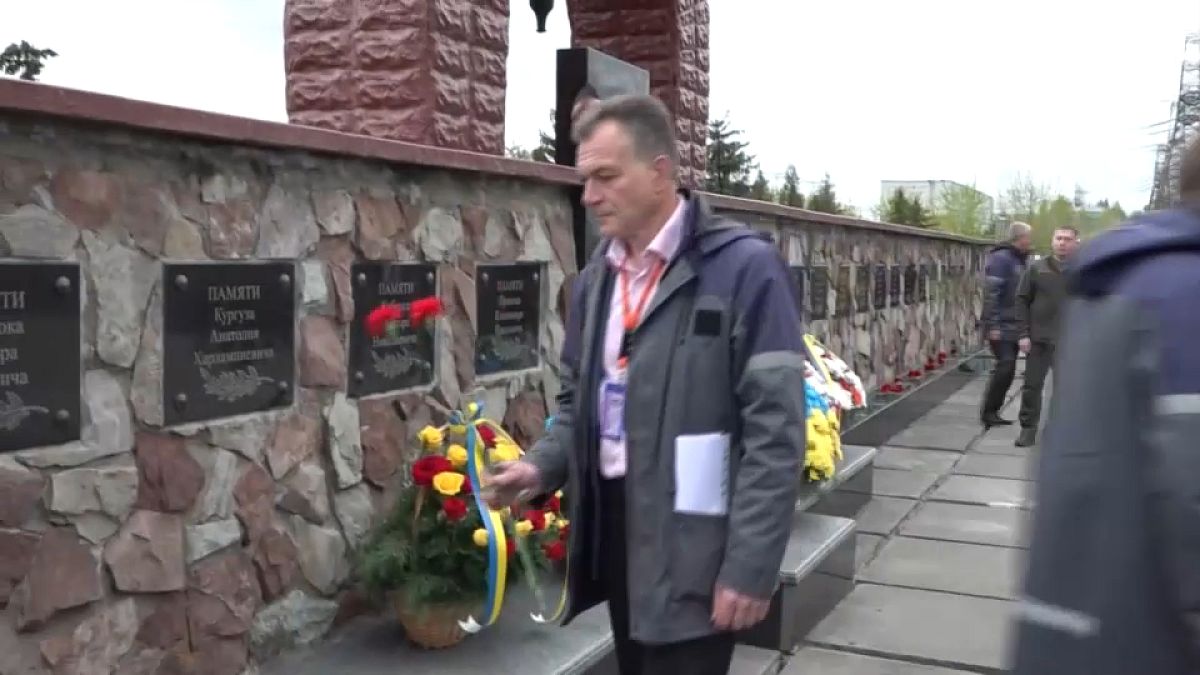
 World1 week ago
World1 week agoZelenskyy warns of Russian nuclear risks on Chernobyl anniversary
-

 Politics1 week ago
Politics1 week agoHouse Republicans brace for spring legislative sprint with one less GOP vote
-

 World1 week ago
World1 week agoAt least four dead in US after dozens of tornadoes rip through Oklahoma
-

 Politics1 week ago
Politics1 week agoAnti-Trump DA's no-show at debate leaves challenger facing off against empty podium

